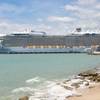Denmark-based shipping and oil company A.P. Møller-Mærsk A/S (Maersk)'s decision to split the group into two parts now get the credit rating agency for questioning to the light blue conglomerate's debt. It ends "probably" with a downgrade, because large parts of the oil revenue will no longer contribute to upholster transport division.
"We have placed the ratings of Maersk on review for downgrade because we believe that its business diversification will reduce significantly with the separation of its energy businesses which represented 62% of EBITDA as of the first half of 2016," says Maria Maslovsky, a Moody's Vice President-Senior Analyst and lead analyst for Maersk.
Maria adds: "The review will likely result in a downgrade of at least one notch, although ultimately the rating will depend on the amount of debt that will be allocated to the integrated transport and logistics company, as well as any remaining ownership interests in the energy businesses."
The review will primarily focus on the actions that Maersk intends to take in order to unlock value and create synergies within the newly established transportation and logistics division, the execution risk and timing related to the separation of the energy businesses, as well as the expected impact on financial metrics.
The review will also focus on the company's future financial policy which includes defined key financial ratio targets in line with an investment grade rating. We expect to conclude the review by the end of December 2016.
On 22 September 2016, Maersk announced that it will become an integrated transport and logistics company with oil and oil related businesses, either individually or in combination, to be separated from the company via joint ventures, mergers, listing or other transactions.
The new Transport & Logistics business will consist of Maersk Line, APM Terminals, Damco, Svitzer and Maersk Container Industry. These business lines will focus on improving product offerings and developing digital solutions for the industry.
Maersk expects to generate up to 2% ROIC improvement over three years and the company envisions investments primarily in acquisitions. Maersk also stated its commitment to capital discipline and investment grade financial profile, although the company did not elaborate on the specific leverage targets.
The energy business will consist of Maersk Oil, Maersk Drilling, Maersk Tankers and Maersk Supply Service. Maersk aims to find solutions for the individual entities within this business within 24 months and will evaluate different solutions including joint ventures, mergers or listing.
Further, Maersk anticipates continuing already sanctioned investments in strategic projects, while its goal will be to keep overall exploration expenses at a low level.
Moody's views all of Maersk's businesses as currently pressured, with oversupply driving down freight rates in the container shipping business resulting in all major liners, including Maersk Line, reporting negative EBIT in the second quarter of 2016.
Low oil prices are negatively impacting E&P businesses while reduced spending by the major oil firms puts negative pressure on the drilling business where, as of 30 June 2016, Maersk's contract coverage was expected to decline from 73% in the second half of 2016 to 56% in 2017 and 45% in 2018.










